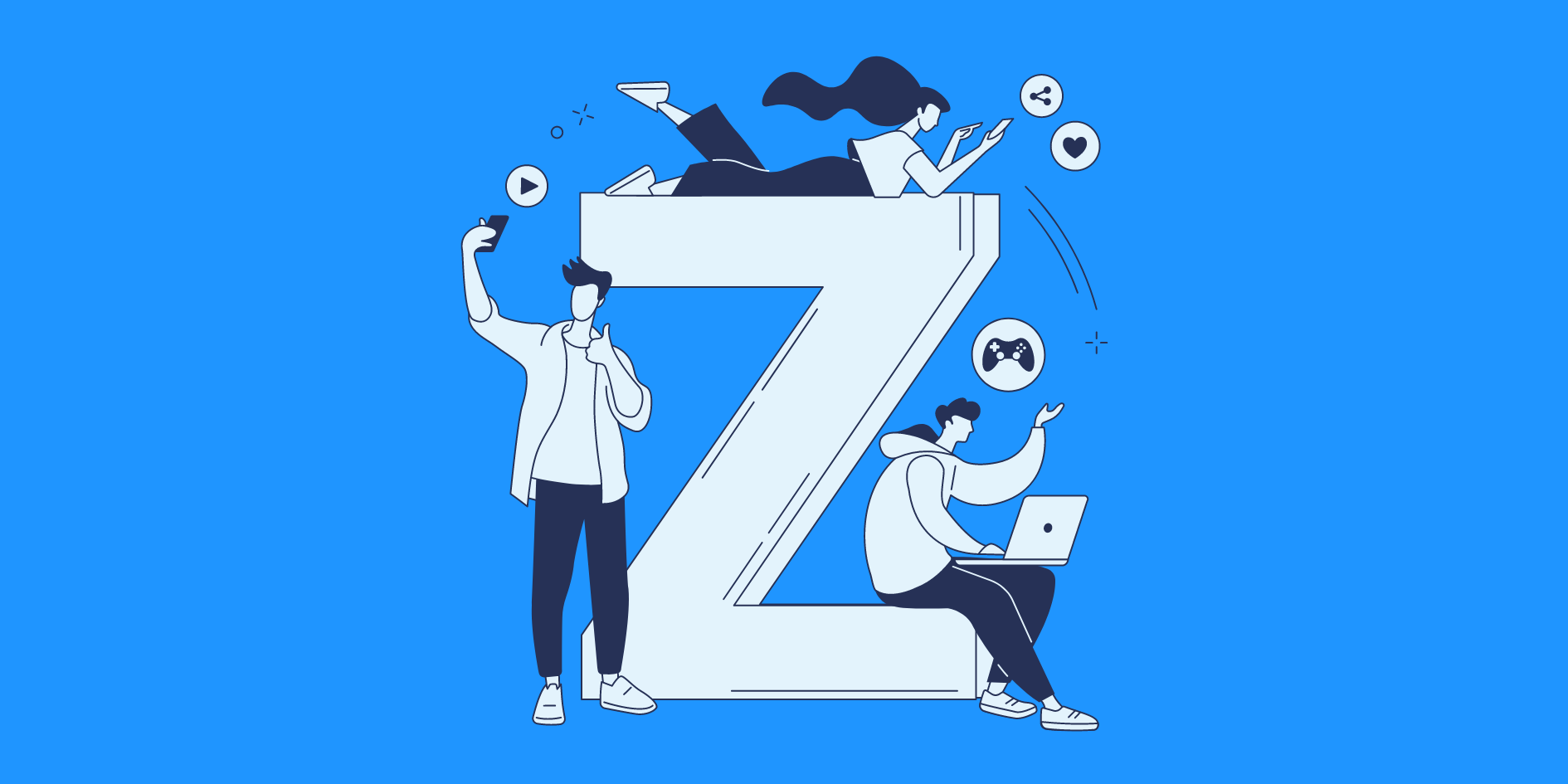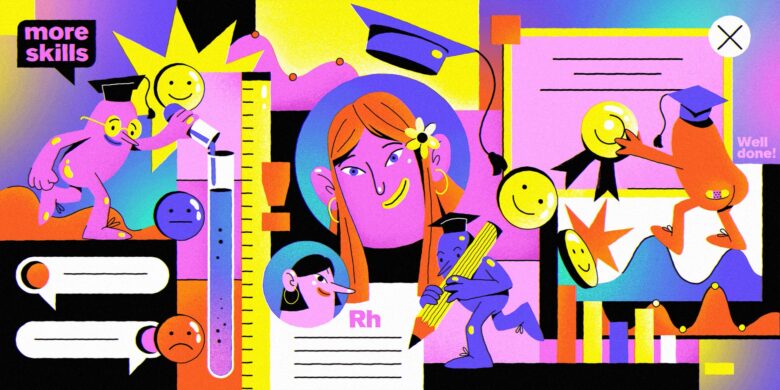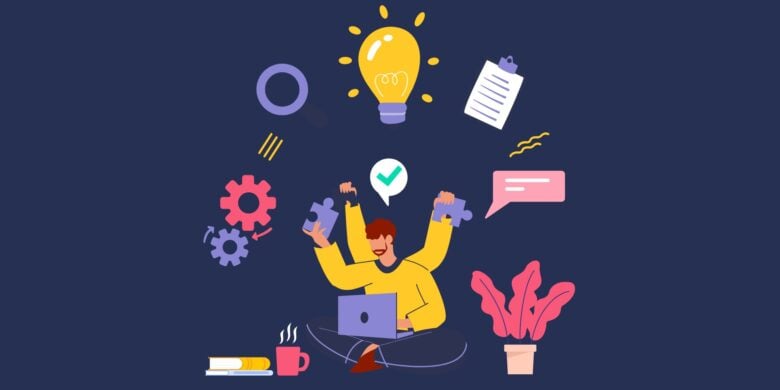As Generation Z marches into the office, armed with freshly printed diplomas and cell phones, companies everywhere are scrambling to figure out what makes these new additions tick. The challenge of engaging younger workers begins with understanding them.
Meshing generations in the workplace isn’t always easy. While these new employees bring fresh perspectives and digital fluency, integrating their expectations and values into traditional work environments poses unique challenges.
What does the younger generation bring to the table? Young people are adept at navigating new technologies and driving innovation with their unique insights. Gen Z challenges the traditional ideals of workplaces and forces a reevaluation of longstanding norms.
Luckily, I am a Gen Z expert. As someone who falls into the classification of Gen Z, I’m here to give you the inside scoop. Today, I’ll dive into the hurdles and the advantages of engaging the youngest cohort in the workplace.
Boost your team’s efficiency with Hubstaff's productivity tools
How to understand the mindset of Generation Z
Generation Z has distinct preferences and expectations that noticeably differ from previous generations. In a recent survey, 74% of managers and business leaders said that Gen Z is more challenging to work with than other generations.
Every day, there’s a new article dissecting Gen Z in the workplace. But this isn’t just pointless clickbait — it’s actually helpful to understand their unique outlook on work.
Let’s look at the general mindset of younger generations in the workplace:
- Flexibility and autonomy. Younger workers value flexibility and freedom more than their predecessors. Raised in a digital era of instant access and customization, they want their work environment to adapt and respond to their needs. According to Deloitte research, over half of Gen Zs (54%) and Millennials (59%) think hybrid work is positive for their mental health.

- Work that matters. Younger workers progressively feel that meaningful work is their priority and are willing to change jobs to find that. Around 60% of 18-25-year-olds said they were looking to switch careers in 2023, an increase from 53% in 2022, according to Robert Half.
- Tech-savvy. Technology is second nature to the younger group of workers. They prefer using digital tools and platforms for communication and aim to seamlessly integrate technology into their work processes.
In fact, a recent TalentLMS survey found that 38% of Gen Z employees rely on AI to complete their daily work tasks. Additionally, 68% of these young professionals see AI as a valuable tool, helping streamline their workflow and day-to-day tasks.
By understanding these critical differences in work preferences and expectations, employers can create environments that resonate with Gen Z, ensuring mutual growth and sustained employee engagement.
Differences between Millennials and Gen Z
Before we reopen the Millennial vs. Gen Z comparison, we need to set the record straight. There’s a lot of online buzz about Gen Z, but the first question we need to answer is who Generation Z is. According to the Pew Research Center, Generation Z is anyone born from 1997 onward.
According to the World Economic Forum, Gen Z will make up over a quarter of the workforce by 2025.
Often, Gen Z employees are pitted against the Millennial generation (anyone born from 1981 to 1996) in the media. So, let’s take a look at how these two groups of young workers differ.
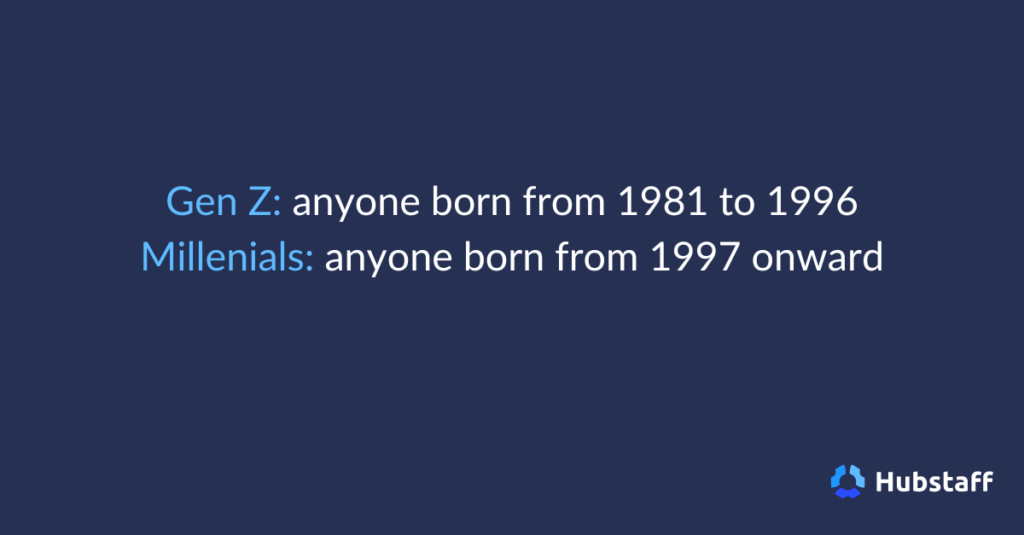
First, to be clear, these are generalizations. There are always anomalies in any group of people. Still, having a broad framework when working with these two unique groups is helpful.
Digital proficiency
- Millennials. Grew up during the rise of the internet, cell phones, and social media. They are tech-savvy compared to the Baby Boomer generation but fall slightly behind Gen Z in technological prowess.
- Gen Z. Born into a world of smartphones and high-speed internet, they are true digital natives adept at multitasking across multiple screens.
Communication preferences
- Millennials. Prefer communication via text and email and are more comfortable with face-to-face interactions.
- Gen Z. Favor faster, more visual methods of communication, like memes and gifs. They socialize and get news primarily through platforms like Snapchat, TikTok, and Instagram.
Work expectations
- Millennials. Value flexibility and purpose in their work but also seek stability and opportunities for advancement within a company.
- Gen Z. Places a higher emphasis on job security and is more pragmatic in job expectations. This is likely influenced by growing up in near-constant economic uncertainty between the Great Recession and the Pandemic.
Education and learning
- Millennials. Value formal education and are the most educated generation.
- Gen Z. Questions the high cost of education and is more likely to seek alternatives like online courses, certifications, and internships.
Understanding these differences can help organizations tailor their marketing, recruitment, and management strategies to align with each generation’s unique characteristics.
Understanding generational differences in engagement
Gen Z is shaking up the workplace with fresh perspectives and tech-savvy skills. Unlike previous generations, they’re not too keen on sticking to one job for too long unless it sparks their interest. This means managers need to go the extra mile to ensure they are engaged at work.
According to Gallup, the number of engaged Baby Boomers (anyone born between 1946 and 1964) has increased from 34% to 36% since 2020. Despite Baby Boomers remaining engaged, Millennials and Gen Z engagement has dropped. Engaged older Millennials are also decreasing.
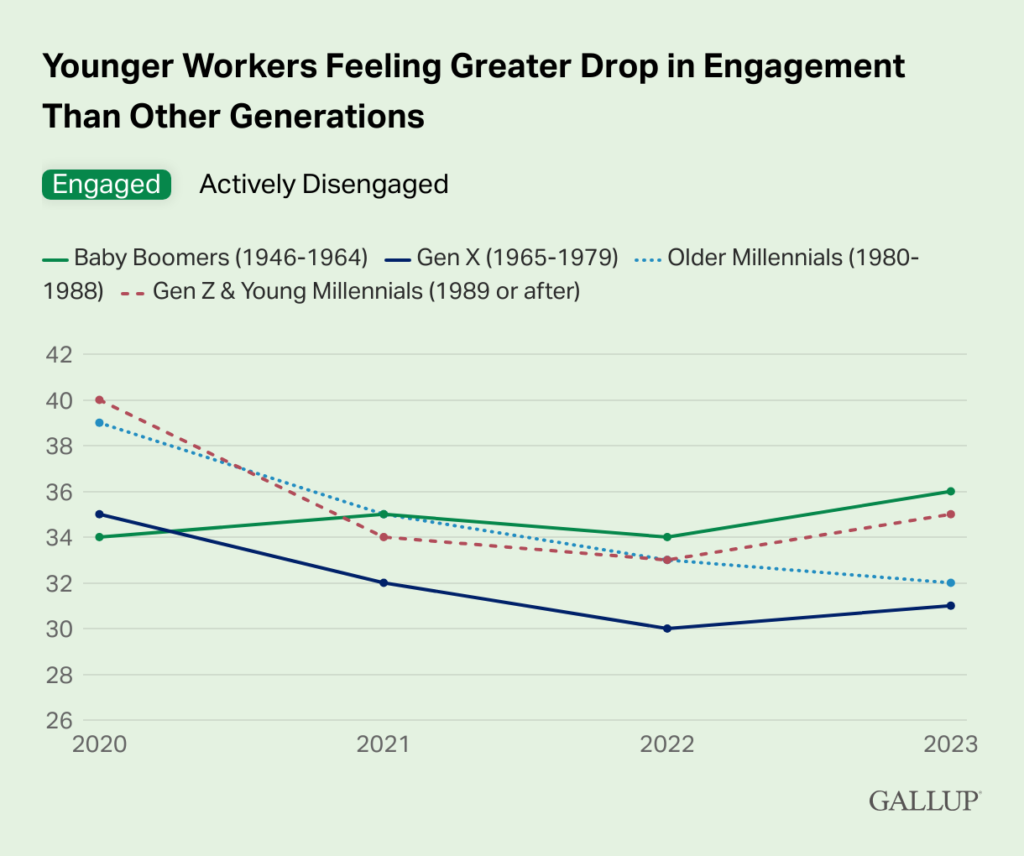
Keeping this younger generation engaged should be a priority for managers, especially considering the link between engaged employees, employee satisfaction, and profits.
Main challenges between Gen Z employees and their bosses
While Gen Z and younger Millennials have slight differences in their mindset, employee challenges and generational differences are more pronounced for Gen Z and Baby Boomers.
Deloitte conducted research and identified three main challenges separating these generations.
Key takeaways
- Empathy in the workplace. Gen Z values empathy highly, ranking it the second most important trait in a boss (whereas bosses typically rank it fifth). Gen Z feels a lack of respect and personal recognition, primarily in environments focused more on productivity.
- Mental health concerns. Less than half of Gen Z employees feel supported by their bosses in managing a healthy workload. 28% struggle with mental health issues due to workplace stress. Gen Z desires more support and meaningful discussions about their careers to help manage stress.
- Work and personal identity. There is a significant difference in how Gen Z employees and their bosses view the role of work in their identities. While 61% of Gen Z feel that work is a significant part of their identity, a higher percentage (86%) of bosses feel the same.
By understanding and working to mend these generational differences, managers can foster a culture that’s not only inclusive but also buzzing with creativity and innovation.
How to keep Generation Z engaged?
To keep up with Gen Z, companies need to do more than listen to their ideas — they need to make them a part of the action. Creating opportunities for them to impact real change makes the workplace a more dynamic and exciting place for everyone.
Comfort, growth, and adaptability at work are essential for younger employees, who won’t hesitate to switch jobs if these needs aren’t met. Retaining younger workers presents a challenge for their bosses, who have different priorities.
Here are key strategies to retain young employees effectively:
Give younger team members a voice
Giving younger team members a voice empowers them in decision-making, which can then significantly impact their engagement and loyalty. This involvement can make them feel valued and integral to the team. It can also encourage a more profound commitment to the company’s goals.
Practical tips
- Use survey tools. Create digital surveys where employees can contribute ideas for projects or improvements.
- Inclusion in strategy meetings. Make it a habit to invite younger employees to strategy meetings so they can share their perspectives.
Creating a positive work environment
A supportive and inclusive culture is vital to encourage a stronger sense of community and collaboration. Members of Generation Z expect a higher level of work-life balance than the previous generation, and mental health experts back up this expectation.
Plus, an inclusive culture helps attract diverse talent. This can enrich the workplace with various perspectives and experiences, leading to more creative solutions and better decision-making. Generation Z is the most diverse generation, so older generations must work to ensure an equitable and inclusive workplace.

Practical tips
- Team building activities. Regularly schedule fun events that foster teamwork and make the workplace more enjoyable.
- Ergonomic and aesthetic workspaces. Design work areas that are visually appealing and physically comfortable to enhance employee satisfaction.
Providing work-life balance and flexibility
Creating a healthy work-life balance and workplace flexibility is increasingly important as younger generations value these aspects in their jobs. They seek work arrangements that allow them to seamlessly blend their professional and personal lives, preferring employers who offer flexible working, remote work options, and generous PTO.
Practical tips
- Flexible hours. Allow employees to choose their working hours within a specific range to accommodate their personal lives. At Hubstaff, we’re fully asynchronous.
- Remote work options. Provide the option to work from home on certain days of the week, enhancing personal time management. As a bonus, Hubstaff data shows remote employees spend more time daily on focused tasks than teams with more in-person office time.

Offering career development and growth opportunities
Offering career development opportunities is essential as young team members are eager to advance their skills and careers. Providing clear pathways for progression and regular training ensures they meet their current job requirements and are prepared for future roles.
Practical tips
- Mentorship programs. Pairing younger employees with experienced mentors provides critical learning and development opportunities.
- Skills training and workshops. Offer regular training sessions in soft skills (like communication) and technical skills relevant to their roles.
Promoting open communication and feedback
Promoting open communication and feedback is essential, as younger employees mainly thrive in environments where feedback is frequent and constructive. This openness helps them adjust and improve quickly and also fosters a sense of transparency and trust within the team.
Practical tips
- Regular feedback sessions. On top of annual reviews, hold weekly or bi-weekly 1:1 meetings or Stand-ups to give your team more consistent feedback.
- Open-door policy. Encourage managers to keep an open-door policy to facilitate informal feedback and progress discussions.

Embracing technology and innovation
Embracing technology and innovation is crucial, particularly as Gen Z becomes a more significant part of the workforce. They expect workplaces to be technologically advanced and support a culture fostering creative thinking and problem-solving.
Practical tips
- Latest tech tools. Regularly update software and tools to streamline workflow and keep the work exciting.
- Innovation challenges. Host regular competitions or hackathons to encourage new ideas and technologies.
By focusing on these areas, companies can create a workplace where younger workers feel valued, supported, and excited to contribute. This then significantly increases employees’ likelihood to stay with the company long-term.
Why are young employees important to the company?
Young employees are not just part of the workforce; they are the future market leaders and innovators. Their importance to any company cannot be overstated — especially as they are poised to take over the market in the coming years.
Investing in and adapting to the needs of younger team members is not just beneficial; it’s imperative for any business aiming to stay relevant and competitive. Chalking an entire generation up as too difficult to work will harm future progress.
When companies try to engage younger workers, they set up their business for long-term success. Embracing and nurturing this potential
Most popular
The Critical Role of Employee Monitoring and Workplace Security
Why do we need employee monitoring and workplace security? Companies had to adapt fast when the world shifted to remote work...
15 Ways to Use AI in the Workforce
Whether through AI-powered project management, strategic planning, or simply automating simple admin work, we’ve seen a dramatic...
The AI Productivity Panel: Lessons From Leaders on What’s Working (and What’s Not)
When I moderated this AI productivity panel, I expected a solid conversation. What I didn’t expect was the flood of real-world i...
Employee Performance Dashboards: Templates, Tools, and Best Practices
Keeping track of how your team’s really doing can be tricky. Spreadsheets pile up, one-on-ones only tell part of the story, and...
